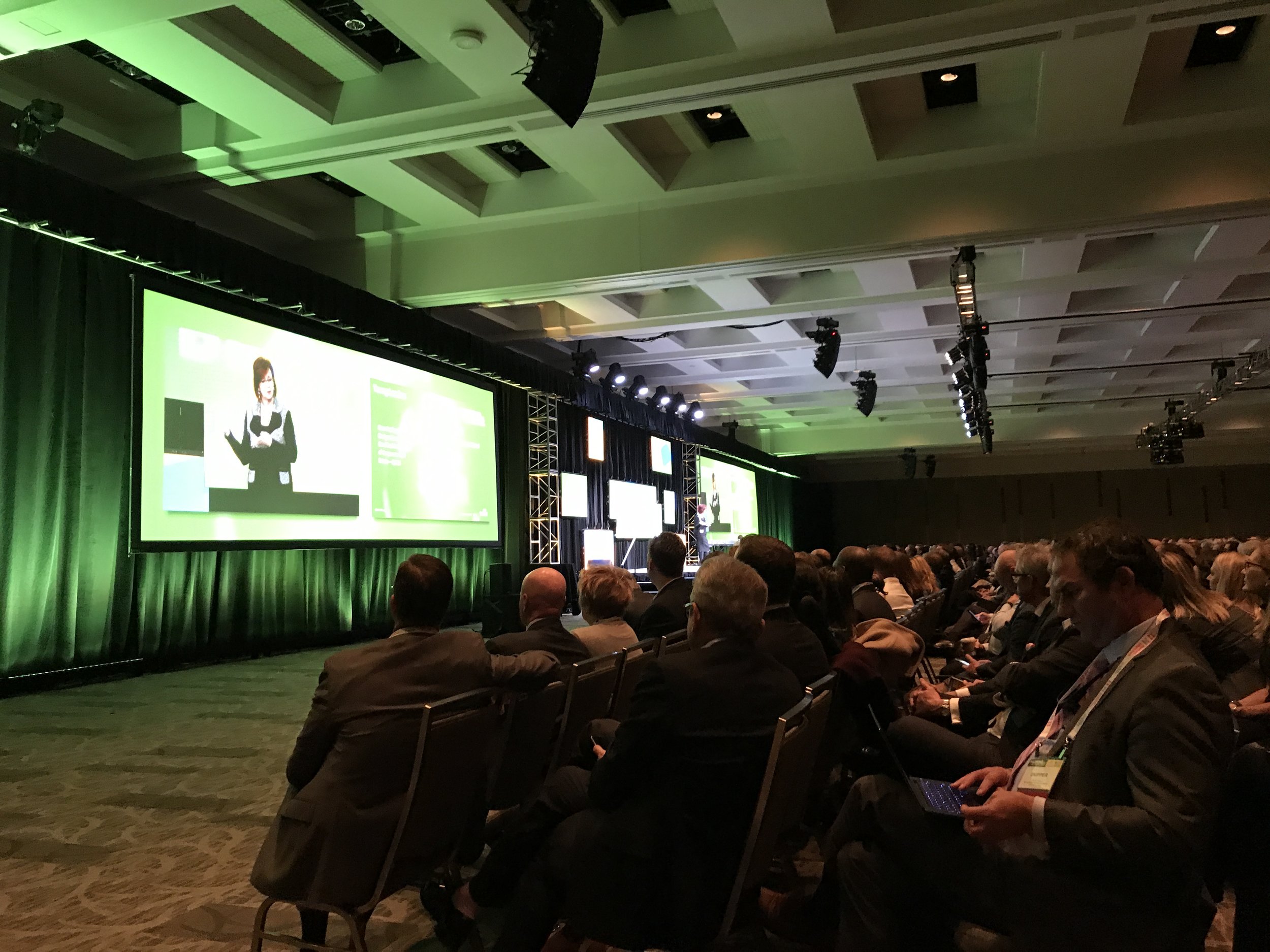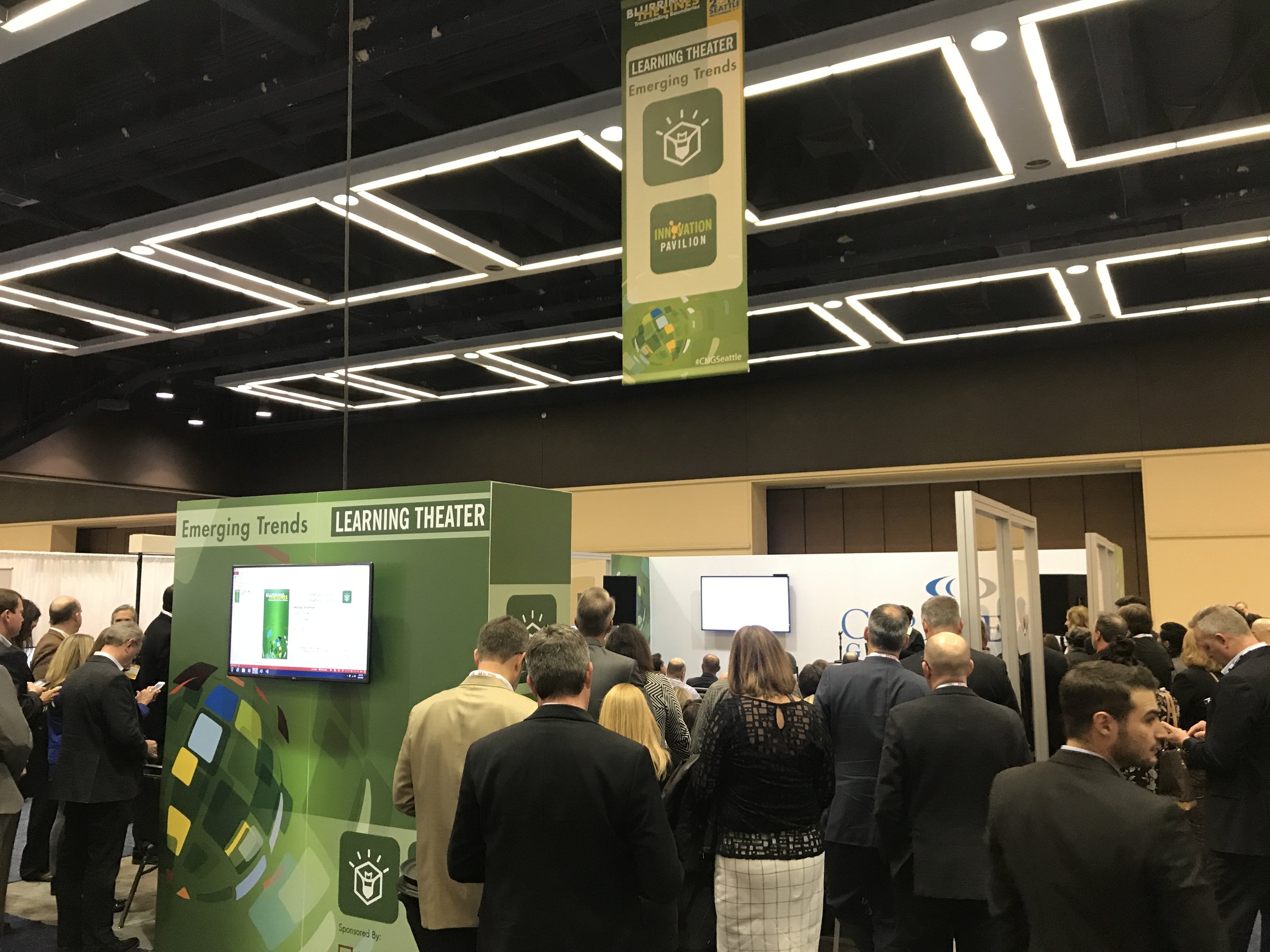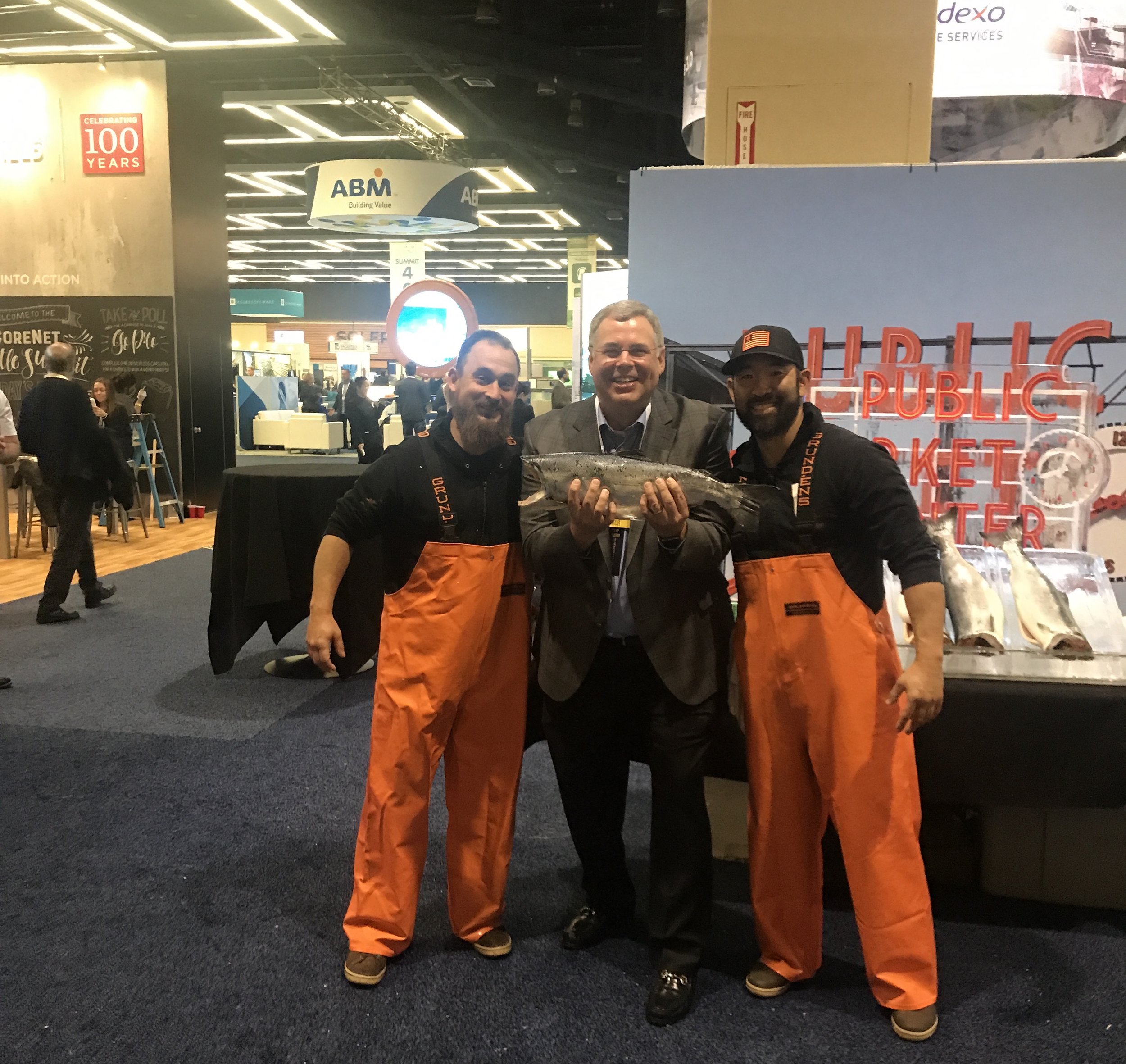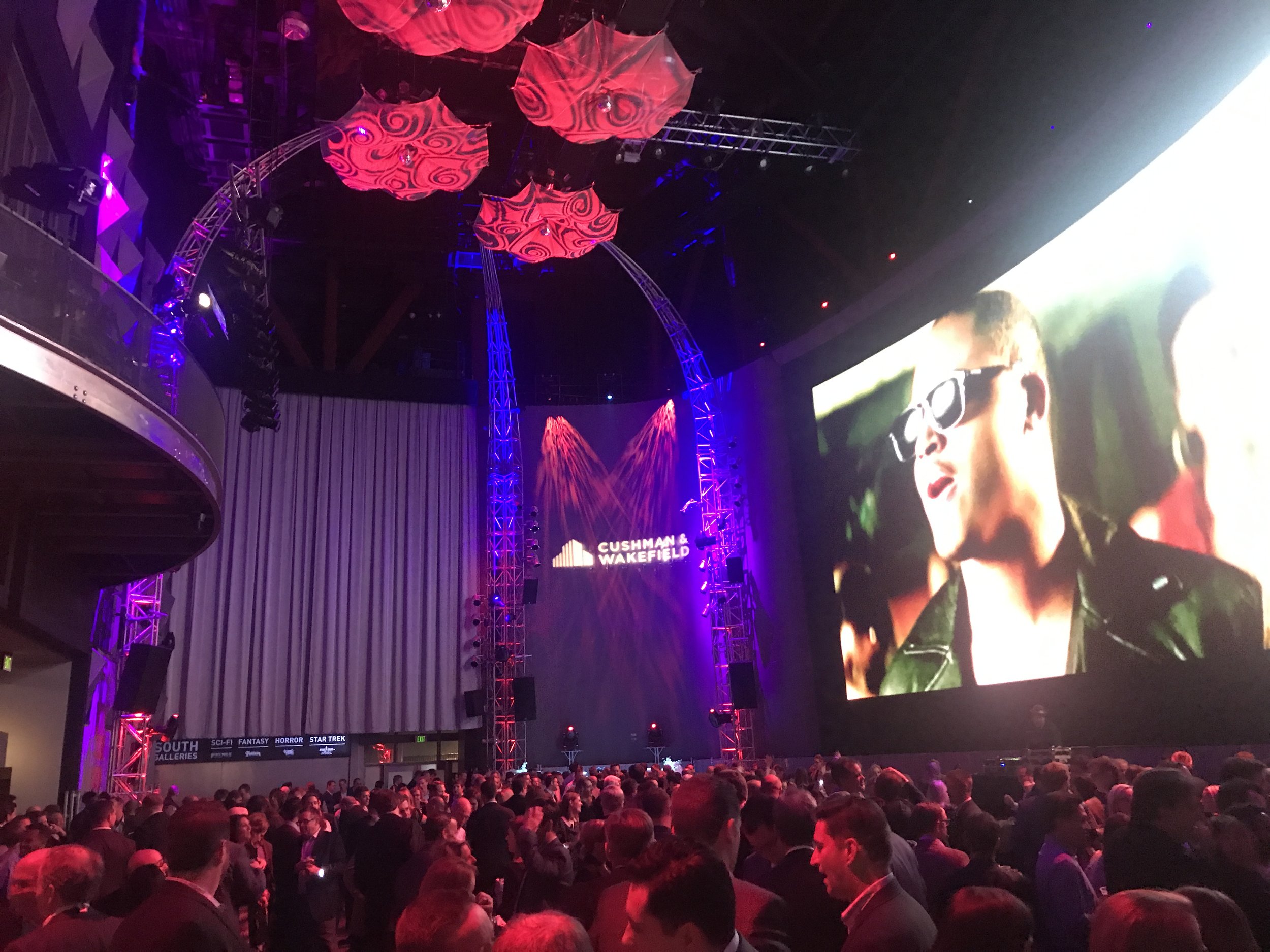Blurred Lines
/Robots and artificial intelligence in the workplace. GenX wants and needs. CoWorking. What impact will self driving cars have on office buildings? Is my industrial conversion office space "authentic" and true to my company's brand? Oh, and I want privacy on demand.
 Those are just some of the topics discussed at the annual confab of all things corporate real estate which is hosted by the trade organization CoreNet Global. The meeting was held in Seattle, Washington which is fitting given that we were collectively at the feet of the mighty Amazon. As the entire world knows, AMZN is in the market with one of the largest space needs in modern corporate real estate history known as #hq2. I was looking around for Alexa everywhere....Real estate executives said the "lines" created by office walls and geographic boundaries are starting to come down - or become blurred lines. With the softening comes even more challenges to CRE's (corporate real estate executives): information and security risk, highly empowered workers with big demands and the need for space to adapt very quickly. The modern workplace must be flexible as to location and then inside the physical space flexible as to different types of work.Here are the things I heard on some of the very hottest topics:Robots and AI
Those are just some of the topics discussed at the annual confab of all things corporate real estate which is hosted by the trade organization CoreNet Global. The meeting was held in Seattle, Washington which is fitting given that we were collectively at the feet of the mighty Amazon. As the entire world knows, AMZN is in the market with one of the largest space needs in modern corporate real estate history known as #hq2. I was looking around for Alexa everywhere....Real estate executives said the "lines" created by office walls and geographic boundaries are starting to come down - or become blurred lines. With the softening comes even more challenges to CRE's (corporate real estate executives): information and security risk, highly empowered workers with big demands and the need for space to adapt very quickly. The modern workplace must be flexible as to location and then inside the physical space flexible as to different types of work.Here are the things I heard on some of the very hottest topics:Robots and AI
- Robots and facility automation will continue to rapidly evolve and relieve humans of low payback activities
- Estimates are $90,000 per year to operate a robot who can operate 24/7 and replace a human security guard.
- We will continue to see the evolution of the building as much more than sticks and bricks. Will seen the emergence of the space as a service provider. In fact, the building itself becomes a machine - automatically changing around furniture, lighting, provide comfort and productivity of every kind and deal with weather.

- Artificial intelligence (AI), which is really code to support machines will become smarter and smarter and specific to corporate real estate. Think of a corporate version of Alexa or Siri.
- High tech drives the need for high touch as people. Rise of the robots means people need to spend more time together
- Robots in the future will be digital "sherpas" so that we don't have to carry digital tools like laptops
- Digital twins in 5 years that are far smarter that Siri will talk to other digital twins for meeting coordination and low level task production
-
Some wondered with all this automation, and the simultaneous happening of the gig economy how does corporate America inculcate culture and values?
Gen Z: Influencing the Real Estate Footprint
- Industrial spaces converted to office is a solution, but what you are really talking about is an input into the process. Its less about the generation and more about where people are in their life's journey. Millenials are just younger baby boomers. As people get older, there are consistencies with what they want. For example, young children are a great equalizer in terms of what people want.
- More face to face interaction helps Gen X with knowledge transfer.

- What do people DO when they are at work? That tells me as a Gen Z a lot about the company?As a Gen X, culture is a lot more important to me than the physical layout.
- Culture is driven by the people in the space, not the design of the space
- People are most happy when they go to work (as in a place) every day if they have a friend at work.
- What has not worked? - You can try too hard. If being hip and cool is not consistent with your corporate culture then it won't ring true. When someone comes into our offices do they get a sense of how they work from the people and the space? If so, that is
- Watch cutting vs. bleeding edge. Make sure your risk tolerance is consistent with technological risk.
- Brand is more than paint on the wall, carpet and color - its the actually embodiment of the mission. Failure: "I saw this really cool thing somewhere else, but didn't stress test in their own organization" before we installed in our office.
- How are you signaling to your people that (1) the work you do is important and (2) we care about you.

- We are talking less about efficiencies now and more about experience. More expensive to have brain drain than savings from densification. Leading a move discussion about efficiencies only is likely to fail. I don't care if my company is saving a dollar on my back. I want to work someplace warm and front. Space needs to serve people through the entire arc of the day.
- We are catering way to much to then new generation (GenZ). We (as corporate America) should be planning for people that are already there. Keep hearing that Gen Z wants what baby boomers want...pengilum will swing. Most important thing is to be in the workplace listen to senior folks on the phone. If I could sit there for 2 hours a day and listen it would be great.
Automation in Cars
- Using fleet car services will fundamentally change the arrival and departure experience in office building. Currently, 90% of arrivals enter through a garage. The new experience feels much more like a hotel motor court.
- Will the Roof become the new lobby with flying cars?
- We heard that developers are starting to plan building with higher garage clear heights so they can be adaptively reused when personal cars are no longer a "thing."
CoWorking
- Why do we in corporate America care if employees like coworking? War for talent - 73% of organizational leaders are concerned about the availability of skilled labor
- Coworker is not just the struggling entrepreneur - average age is 38
 First place is the office, second place is the home, third place is Starbucks, place 3.5 is the car in the Starbucks parking lot for conference calls, and fourth place is coworking.
First place is the office, second place is the home, third place is Starbucks, place 3.5 is the car in the Starbucks parking lot for conference calls, and fourth place is coworking.
- Targets by coworking providers are no longer as much individuals - chasing corporate America
- New term: a "Jelly" - organic group or people who glom on to each other and hang out - like in a Starbucks or other quick service restaurants.
- Todays employees want choice, community and flexibility
- 77% of facilities are in an urban location and 62% looking to expand and move to larger locations.
- Several years ago, question was is this a fad? with 62% of centers looking to expand, this is not a fad. Will disrupt the industry
- Average number of member is 75 members
- Seeing the emergence of the "big box" retailer - A solution that is focused on targeting corporations to provide space.
- WeWork is the largest tenant in New York City and one of the largest consumers or real estate in the world.
Privacy and Productivity
- One of the biggest complaints in open workplaces is privacy and the ability to have quiet and private phone calls.

- Young people stated the need for "real time privacy."
- Ripping out all private spaces and forcing collaborations totally ignores introverts. Millennials complain amongst themselves about being in a open environment.
- Open Plan, Friend or Foe? An open plan can be really bad. So can an office. All not created equal. Like saying all automobiles are the same.
- A new trend is "activity based" planning. Developing new ways to connect in open plan design based on what you are doing. Design is in a progression and is progressing.
- Wellness is fundamental to productivity. A sick workforce is no workforce.
In sum, the energy is high and the feeling is optimistic. Most directors of corporate real estate have a pep in their step, but are drowning in emails and assignments to expand.I surmise from the conference that most everyone is growing quickly and thinking about how to keep the workforce engaged, happy and healthy. Improving the quality of work-life balance and overall work experience are what sought after employees are seeking in companies - current and future.All is well with the CRE world in 2017. The good times will continue in 2018 as well and beyond.Whistle while you work - wherever that might be. And step right over those blurry lines!



